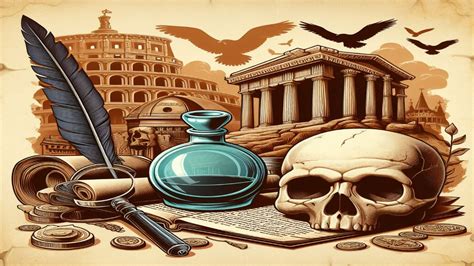History, like a labyrinthine tapestry, weaves a complex narrative of human events, leaving behind a trail of tantalizing questions that have captivated scholars and ignited imaginations for centuries. From the enigmatic origins of civilizations to the pivotal turning points that shaped our world, the tapestry of history is embroidered with mysteries that continue to challenge our understanding of the past.

Questions on the Origins of Civilization
1. Where and When Did Humanity Emerge?
The earliest known human remains, dating back 2.8 million years, were discovered in Ethiopia, but the precise location and timing of humanity’s genesis remain elusive. Recent findings suggest that human ancestors may have diverged from their chimpanzee cousins in Central Africa approximately 6-7 million years ago.
2. What Factors Triggered the Rise of Agriculture?
The transition from a nomadic, hunter-gatherer lifestyle to settled agriculture was one of the most transformative events in human history. Around 10,000 years ago, in the Fertile Crescent of the Middle East, a convergence of factors, including climate change, population growth, and technological innovations, likely sparked the dawn of agriculture.
Questions on Ancient Civilizations
3. Why Did the Indus Valley Civilization Collapse?
The Indus Valley Civilization, one of the world’s oldest and most advanced ancient civilizations, flourished in present-day Pakistan and northwestern India from 2600 to 1900 BCE. However, around 1900 BCE, the civilization mysteriously declined. Theories range from natural disasters to climate change or invasion by nomadic tribes.
4. What is the Riddle of the Minoan Eruption?
The Minoan civilization, which flourished on the Greek island of Crete, was destroyed by a cataclysmic volcanic eruption on the neighboring island of Thera (modern-day Santorini) around 1600 BCE. The eruption generated a massive tsunami and ash cloud that devastated the Minoan civilization and its famed palace-complexes at Knossos and Phaistos.
Questions on Historical Turning Points
5. Was the Roman Empire Destined to Fall?
The Roman Empire, once the dominant power in the Western world, collapsed in the 5th-century CE. Scholars have debated the causes of the empire’s demise, which may have included factors such as economic crisis, political instability, military overextension, and incursions by barbarian tribes.
6. What were the Triggers for the Hundred Years’ War?
The Hundred Years’ War (1337-1453) was a series of conflicts between England and France that transformed the political and military landscape of Europe. The rivalry between the two countries, along with dynastic disputes and territorial ambitions, ignited the war, which ultimately led to the rise of England as a major European power.
Questions on Modern History
7. What Drove the Cold War’s Escalation?
The Cold War (1947-1991) was an ideological and political conflict between the United States and the Soviet Union that polarized the world. The arms race, the division of Europe, and the Cuban Missile Crisis were critical junctures in the Cold War’s escalation, ultimately threatening global stability.
8. What Factors Contributed to the Fall of the Soviet Union?
In 1991, the Soviet Union, a global superpower, dissolved. Economic stagnation, political corruption, and the rise of nationalist movements within the Soviet republic contributed to its collapse, marking a pivotal moment in world history.
Tips and Tricks for Exploring History’s Mysteries
- Embrace Multiple Perspectives: Examine events and figures from different angles to gain a more comprehensive understanding.
- Consult Primary Sources: Analyze original documents, artifacts, and firsthand accounts to gain insights into the past.
- Consider the Context: Understand the social, economic, and political environment surrounding historical events to contextualize their significance.
Common Mistakes to Avoid
- Oversimplification: Avoid reducing complex historical events to simplistic narratives. History is often a tapestry of interconnected factors.
- Chronological Error: Ensure accuracy in timelines and chronological order to avoid confusing interpretations.
- Biased Interpretation: Be aware of potential biases in historical sources and strive for objective analysis.
Frequently Asked Questions
1. Can History Repeat Itself?
History teaches us lessons about human behavior, but it is difficult to predict exact repetitions of past events.
2. Is History Objective?
Historical interpretation is often influenced by the perspectives and biases of historians. Objectivity is a goal, but complete neutrality is rarely achievable.
3. What is the Value of Studying History?
History provides insights into human nature, fosters critical thinking, and enhances our understanding of the present and future.
4. How Can We Learn from History’s Mistakes?
By studying past errors, we can identify patterns and avoid repeating them in the present.
5. What are Key Skills for Historical Research?
Strong reading comprehension, critical thinking, and analytical skills are essential for effective historical research.
6. How Can We Preserve Historical Sites and Artifacts?
Conservation efforts are crucial to protect historical structures, documents, and objects from degradation and ensure their availability for future generations.
Tables for Historical Insights
| Ancient Civilization | Timeline | Key Achievements | Demise |
|---|---|---|---|
| Indus Valley Civilization | 2600-1900 BCE | Urban planning, writing, irrigation | Unknown |
| Minoan Civilization | 2700-1450 BCE | Palace-complexes, advanced art, maritime dominance | Thera volcanic eruption |
| Roman Empire | 27 BCE – 476 CE | Large-scale infrastructure, legal system, empire expansion | Political instability, economic crisis |
| Mongol Empire | 1206-1368 | Massive territorial expansion, cultural exchange, Pax Mongolica | Internal conflicts, natural disasters |
| Historical Turning Point | Timeline | Causes | Consequences |
|---|---|---|---|
| Hundred Years’ War | 1337-1453 | Dynastic disputes, territorial ambitions | Rise of England as a European power, decline of feudalism |
| Cold War | 1947-1991 | Ideological rivalry, arms race | Nuclear standoff, global tension, space race |
| Fall of Soviet Union | 1991 | Economic stagnation, political corruption, nationalist movements | End of the Cold War, geopolitical realignment |
